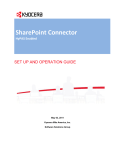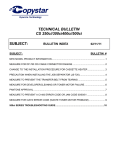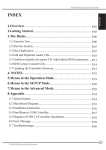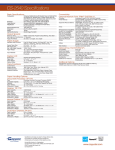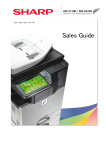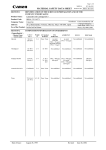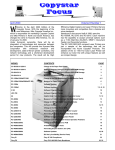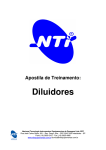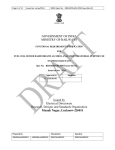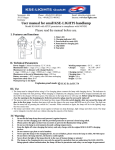Download CS 400ci, 500ci, 552ci Toner - Integrated Office Solutions
Transcript
MATERIAL SAFETY DATA SHEET Section 1. Chemical Product and Company Identification Product Name Black Toner For CS 400ci, 500ci, 552ci Manufacturer Kyocera Mita Corporation COPYSTAR, A DIVISION OF Address Telephone Number Kyocera Mita America, Inc. 225 Sand Road Fairfield, NJ 07004 (973)-808-8444 Date February 09, 2010 Section 2. Composition/Information on Ingredients Hazardous Components (Chemical Identity, Common Name/s ) (CAS No. 1333-86-4) Carbon Black (CAS No. 7631-86-9) Amorphous Silica OSHA PEL SubpartZ PEL ACGIH TLV IARC NTP Weight% 3.5mg/m3(TWA) 3.5mg/m3(TWA) Group 2B Not Listed 5-10 80mg/m3/%SiO2(TWA) Not Listed Group3 Not Listed 1-5 (Non Hazardous Ingredients) Polyester resin 70-80 Styrene acrylate copolymer 1-5 Wax 1-5 Section 3. Hazards Identification Most Important Hazards None Specific Hazards None Other Information on Hazards: Potential Health Effects: Ingestion Ingestion is not applicable route of entry for intended use. Inhalation Prolonged inhalation of excessive dusts may cause lung damage. Use of this product, as intended, does not result in inhalation of excessive dusts. Eye Contact May cause eye irritation. Skin Contact Unlikely to cause skin irritation. Page 1 MATERIAL SAFETY DATA SHEET Section 4. First Aid Measures Inhalation Remove from exposure to fresh air and gargle with plenty of water. Seek medical treatment in case of such a symptom as coughing. Skin Contact Wash with soap and water. If irritation does occur, seek medical treatment. Eye Contact Flush thoroughly with water and seek medical treatment. Ingestion Ingestion is not applicable route of entry for intended use. Rinse out mouth. Drink one or two glasses of water to dilute. Seek medical treatment if necessary. Section 5. Fire Fighting Measures Extinguishing Media Water (Sprinkle with water), Foam, Powder, C02 or Dry Chemical Extinguisher. Fire Fighting Procedures Pay attention not to blow away toner powder. Drain water off around and decrease the atmosphere temperature to extinguish the fire. Section 6. Accidental Release Measures Personal Precautions Avoid inhalation, ingestion, eye and skin contact in case of accidental toner release. Environmental Precautions No special precaution. Method for Cleaning Up Gather the released toner, not blowing away, and wipe up with a wet cloth. Section 7. Handling and Storage Handling Keep the container tightly closed. Keep away from children. Storage Keep the container tightly closed and store in a cool, dry and dark place keeping away from fire. Keep away from children. Section 8. Exposure Controls/Personal Protection Exposure Guidelines See Section 2 Control Parameters<Reference Data> Inhalable fraction 10mg/m3, Respirable fraction 3mg/m3 ACGIH TLV(2008)-TWA Total dust 15mg/m3, Respirable fraction 5mg/m3 OSHA PEL(2006)-TWA Protective Equipment Respiratory Protection None required under normal use. Eye/Face Protection None required under normal use. Hand/Skin/Body Protection None required under normal use. Ventilation Ventilator is not required under normal use. Black Toner For CS 400ci, 500ci, 552ci Page 2 of 4 2/9/2010 MATERIAL SAFETY DATA SHEET Section 9. Physical and Chemical Properties Appearance Physical state Form Color Odor Solid Fine powder Black Odorless pH N.A. Melting Point 100-1200C Explosion Properties Dust explosion is improbable under normal use. Experimental explosiveness of toner is classified into the same rank such kind of powder as flour, dry milk and resin powder according to the pressure rising speed. Specific Gravity 1.2-1.4g/cm3 Solubility Almost insoluble in water. Section 10. Stability and Reactivity Stability/Reactivity Stable under normal use. Hazardous Decomposition Products None Section 11. Toxicological Information Acute oral toxicity (rat)LD50>2,000mg/kg (Estimated from other products containing same materials.) Acute dermal toxicity (rat)LD50>2,000mg/kg (Estimated from Acute oral toxicity for same product.) Acute inhalation toxicity (rat)LC50(4hr)>5.02mg/l (Estimated from other products containing same materials.) Acute eye irritation (rabbit) Minimal irritant (Estimated from other products containing same materials.) Acute skin irritation (rabbit) Mild irritant (Estimated from other products containing same materials.) Skin sensitization (mouse)Non-Sensitiser (Estimated from other products containing same materials.) Mutagenicity Ames Test is Negative. Reproductive Toxicity No reproductive toxicant, according to MAK, California Proposition 65, TRGS905 and EU Directive(67/548/EEC). Carcinogenicity No carcinogen or potential carcinogen (except carbon black), according to IARC, Japan Association on Industrial Health, ACGIH, EPA, OSHA, NTP, ILO, MAK, California Proposition 65, TRGS905 and EU Directive(67/548/EEC). In 1996, the IARC reevaluated carbon black as a Group 2B carcinogen (possible human carcinogen). This evaluation is given to carbon black for which there is inadequate human evidence, but sufficient animal evidence. The latter is based upon the development of lung tumors in rat receiving chronic inhalation exposures to free carbon black at level that induce particle overload of the lung. Studies performed in animal models other than rats have not demonstrated an association between carbon black and lung tumors. Moreover, a two-year's cancer bioassay using a typical toner preparation containing carbon black demonstrated no association between toner exposure and tumor development in rats. Chronic effects In a study in rats by chronic inhalation exposure to a typical toner, a mild to moderate degree of lung fibrosis was observed in 92% of the rats in the high concentration (16mg/m3) exposure group, and a minimal to mild degree of fibrosis was noted in 22% of the animal in the middle (4mg/m3) exposure group. But no pulmonary change was reported in the lowest (1mg/m3) exposure group, the most relevant level to potential human exposures. Other Information NONE Black Toner For CS 400ci, 500ci, 552ci Page 3 of 4 2/9/2010 MATERIAL SAFETY DATA SHEET Section 12. Ecological Information No data available. Section 13. Disposal Considerations Do not incinerate toner and toner containers. Dangerous sparks may cause burn. Any disposal practice should be done under conditions which meet local, state and federal laws and regulations relating to waste (contact local or state environmental agency for specific rules). Section 14. Transport Information UN No. UN Shipping Name UN Classification UN Packing Group Special Precautions None None None None None Section 15. Regulatory Information US Information All components in this product comply with order under TSCA. EU Information Symbol & Indication R-Phrase S-Phrase Special markings Hazardous ingredients for labeling: Label information according to the Directives 67/548/EEC and 1999/45/EEC) Not required Not required Not required Not required None Canada Information This product is not a WHMIS-controlled product, since we consider it as a Manufactured article. Section 16. Other Information Abbreviation OSHA PEL ACGIH TLV TWA MAK TRGS IARC EPA NTP ILO UN TSCA WHMIS Occupational Safety and Health Administration Permissible Exposure Limit American Conference of Governmental Industrial Hygienists Threshold Limit Value Time Weighted Average Maximale Arbeitsplatzkonzentrationen under Deutsche Forschungsgemeinschaft Technische Regeln für Gefahrstoffe (Deutsche) International Agency for Research on Cancer Environmental Protection Agency (USA) National Toxicology Program International Labour Office United Nations Toxic Substances Control Act (USA) Workplace Hazardous Materials Information System(Canada) Information on this data sheet represents our current data and the best opinion as to the proper use in handling of this product under normal conditions specified in our User's Manual. However, neither Kyocera Mita Corporation nor any of its subsidiaries assumes any liability whatsoever for the accuracy or completeness of the information contained herein. All materials may present unknown hazards and should be used with caution. Although certain hazards are described herein, we do not guarantee that these are the only hazards which exist. End of MSDS Black Toner For CS 400ci, 500ci, 552ci Page 4 of 4 2/9/2010 MATERIAL SAFETY DATA SHEET Section 1. Chemical Product and Company Identification Product Name Cyan Toner For CS 400ci, 500ci, 552ci Manufacturer Kyocera Mita Corporation Address COPYSTAR, A DIVISION OF Telephone Number Kyocera Mita America, Inc. 225 Sand Road Fairfield, NJ 07004 (973)-808-8444 February 09, 2010 Date Section 2. Composition/Information on Ingredients Hazardous Components OSHA PEL SubpartZ ACGIH TLV IARC NTP Weight% 80mg/m3/%SiO2(TWA) Not Listed Group3 Not Listed 1-5 (Chemical Identity, Common Name/s ) (CAS No. 7631-86-9) Amorphous Silica (Non Hazardous Ingredients) Polyester resin 1 70-80 Polyester resin 2 5-10 Organic Pigment 1-5 Styrene-acrylate copolymer 1-5 Section 3. Hazards Identification Most Important Hazards None Specific Hazards None Other Information on Hazards: Potential Health Effects: Ingestion Ingestion is not applicable route of entry for intended use. Inhalation Prolonged inhalation of excessive dusts may cause lung damage. Use of this product, as intended, does not result in inhalation of excessive dusts. Eye Contact May cause eye irritation. Skin Contact Unlikely to cause skin irritation. Page 1 MATERIAL SAFETY DATA SHEET Section 4. First Aid Measures Inhalation Remove from exposure to fresh air and gargle with plenty of water. Seek medical treatment in case of such a symptom as coughing. Skin Contact Wash with soap and water. If irritation does occur, seek medical treatment. Eye Contact Flush thoroughly with water and seek medical treatment. Ingestion Ingestion is not applicable route of entry for intended use. Rinse out mouth. Drink one or two glasses of water to dilute. Seek medical treatment if necessary. Section 5. Fire Fighting Measures Extinguishing Media Water (Sprinkle with water), Foam, Powder, C02 or Dry Chemical Extinguisher. Fire Fighting Procedures Pay attention not to blow away toner powder. Drain water off around and decrease the atmosphere temperature to extinguish the fire. Section 6. Accidental Release Measures Personal Precautions Avoid inhalation, ingestion, eye and skin contact in case of accidental toner release. Environmental Precautions No special precaution. Method for Cleaning Up Gather the released toner not to blow away and wipe up with a wet cloth. Section 7. Handling and Storage Handling Keep the container tightly closed. Keep away from children. Storage Keep the container tightly closed and store in a cool, dry and dark place keeping away from fire. Keep away from children. Section 8. Exposure Controls/Personal Protection Exposure Guidelines See Section 2 Control Parameters<Reference Data> Inhalable fraction 10mg/m3, Respirable fraction 3mg/m3 ACGIH TLV(2008)-TWA Total dust 15mg/m3, Respirable fraction 5mg/m3 OSHA PEL(2006)-TWA Protective Equipment Respiratory Protection None required under normal use. Eye/Face Protection None required under normal use. Hand/Skin/Body Protection None required under normal use. Ventilation Ventilator is not required under normal use. Cyan Toner For CS 400ci, 500ci, 552ci Page 2 of 4 2/9/2010 MATERIAL SAFETY DATA SHEET Section 9. Physical and Chemical Properties Appearance Physical state Form Solid Fine powder Color Cyan Odor Odorless pH N.A. Melting Point 100-1200C Explosion Properties Dust explosion is improbable under normal use. Experimental explosiveness of toner is classified into the same rank such kind of powder as flour, dry milk and resin powder according to the pressure rising speed. Density 1.2-1.4g/cm3 Solubility Almost insoluble in water. Section 10. Stability and Reactivity Stability/Reactivity Stable under normal use. Hazardous Decomposition Products None Section 11. Toxicological Information Acute oral toxicity (rat)LD50>2,000mg/kg (Estimated from other products containing same materials.) Acute dermal toxicity (rat)LD50>2,000mg/kg (Estimated from Acute oral toxicity for same product.) Acute inhalation toxicity (rat)LC50(4hr)>4.98mg/l (This value is the maximum attainable concentration for dust.) (Estimated from other products containing same materials.) Acute eye irritation (rabbit) Minimal irritant (Estimated from other products containing same materials.) Acute skin irritation (rabbit) Mild irritant (Estimated from other products containing same materials.) Skin sensitization (mouse)Non-Sensitiser (Estimated from other products containing same materials.) Mutagenicity Ames Test is Negative. Reproductive Toxicity No reproductive toxicant, according to MAK, California Proposition 65, TRGS905 and EU Directive(67/548/EEC). Carcinogenicity No carcinogen or potential carcinogen according to IARC, Japan Association on Industrial Health, ACGIH, EPA, OSHA, NTP, ILO, MAK, California Proposition 65, TRGS905 and EU Directive(67/548/EEC). Chronic effects In a study in rats by chronic inhalation exposure to a typical toner, a mild to moderate degree of lung fibrosis was observed in 92% of the rats in the high concentration (16mg/m3) exposure group, and a minimal to mild degree of fibrosis was noted in 22% of the animal in the middle (4mg/m3) exposure group. But no pulmonary change was reported in the lowest (1mg/m3) exposure group, the most relevant level to potential human exposures. Other Information NONE Cyan Toner For CS 400ci, 500ci, 552ci Page 3 of 4 2/9/2010 MATERIAL SAFETY DATA SHEET Section 12. Ecological Information No data available. Section 13. Disposal Considerations Do not incinerate toner and toner containers. Dangerous sparks may cause burn. Any disposal practice should be done under conditions which meet local, state and federal laws and regulations relating to waste (contact local or state environmental agency for specific rules). Section 14. Transport Information UN No. UN Shipping Name UN Classification UN Packing Group Special Precautions None None None None None Section 15. Regulatory Information US Information All components in this product comply with order under TSCA. EU Information Symbol & Indication R-Phrase S-Phrase Special markings Hazardous ingredients for labeling: Label information according to the Directives 67/548/EEC and 1999/45/EEC) Not required Not required Not required Not required None Canada Information This product is not a WHMIS-controlled product, since we consider it as a Manufactured article. Section 16. Other Information Abbreviation OSHA PEL ACGIH TLV TWA MAK TRGS IARC EPA NTP ILO UN TSCA WHMIS Occupational Safety and Health Administration Permissible Exposure Limit American Conference of Governmental Industrial Hygienists Threshold Limit Value Time Weighted Average Maximale Arbeitsplatzkonzentrationen under Deutsche Forschungsgemeinschaft Technische Regeln für Gefahrstoffe (Deutsche) International Agency for Research on Cancer Environmental Protection Agency (USA) National Toxicology Program International Labour Office United Nations Toxic Substances Control Act (USA) Workplace Hazardous Materials Information System(Canada) Information on this data sheet represents our current data and the best opinion as to the proper use in handling of this product under normal conditions specified in our User's Manual. However, neither Kyocera Mita Corporation nor any of its subsidiaries assumes any liability whatsoever for the accuracy or completeness of the information contained herein. All materials may present unknown hazards and should be used with caution. Although certain hazards are described herein, we do not guarantee that these are the only hazards which exist. End of MSDS Cyan Toner For CS 400ci, 500ci, 552ci Page 4 of 4 2/9/2010 MATERIAL SAFETY DATA SHEET Section 1. Chemical Product and Company Identification Product Name Magenta Toner For CS 400ci, 500ci, 552ci Manufacturer Kyocera Mita Corporation Address COPYSTAR, A DIVISION OF Telephone Number Kyocera Mita America, Inc. 225 Sand Road Fairfield, NJ 07004 (973)-808-8444 February 09, 2010 Date Section 2. Composition/Information on Ingredients Hazardous Components OSHA PEL SubpartZ ACGIH TLV IARC NTP Weight% 80mg/m3/%SiO2(TWA) Not Listed Group3 Not Listed 1-5 (Chemical Identity, Common Name/s ) (CAS No. 7631-86-9) Amorphous Silica (Non Hazardous Ingredients) Polyester resin 1 70-80 Polyester resin 2 5-10 Organic pigment 1-5 Styrene acrylate copolymer 1-5 Section 3. Hazards Identification Most Important Hazards None Specific Hazards None Other Information on Hazards: Potential Health Effects: Ingestion Ingestion is not applicable route of entry for intended use. Inhalation Prolonged inhalation of excessive dusts may cause lung damage. Use of this product, as intended, does not result in inhalation of excessive dusts. Eye Contact May cause eye irritation. Skin Contact Unlikely to cause skin irritation. Page 1 MATERIAL SAFETY DATA SHEET Section 4. First Aid Measures Inhalation Remove from exposure to fresh air and gargle with plenty of water. Seek medical treatment in case of such a symptom as coughing. Skin Contact Wash with soap and water. If irritation does occur, seek medical treatment. Eye Contact Flush thoroughly with water and seek medical treatment. Ingestion Ingestion is not applicable route of entry for intended use. Rinse out mouth. Drink one or two glasses of water to dilute. Seek medical treatment if necessary. Section 5. Fire Fighting Measures Extinguishing Media Water(Sprinkle with water), Foam, Powder, C02 or Dry Chemical Extinguisher. Fire Fighting Procedures Pay attention not to blow away toner powder. Drain water off around and decrease the atmosphere temperature to extinguish the fire. Section 6. Accidental Release Measures Personal Precautions Avoid inhalation, ingestion, eye and skin contact in case of accidental toner release. Environmental Precautions No special precaution. Method for Cleaning Up Gather the released toner not to blow away and wipe up with a wet cloth. Section 7. Handling and Storage Handling Keep the container tightly closed. Keep away from children. Storage Keep the container tightly closed and store in a cool, dry and dark place keeping away from fire. Keep away from children. Section 8. Exposure Controls/Personal Protection Exposure Guidelines See Section 2 Control Parameters<Reference Data> Inhalable fraction 10mg/m3, Respirable fraction 3mg/m3 ACGIH TLV(2008)-TWA Total dust 15mg/m3, Respirable fraction 5mg/m3 OSHA PEL(2006)-TWA Protective Equipment Respiratory Protection None required under normal use. Eye/Face Protection None required under normal use. Skin/Hand/Body Protection None required under normal use. Ventilation Ventilator is not required under normal use. Magenta Toner For CS 400ci, 500ci, 552ci Page 2 of 4 2/9/2010 MATERIAL SAFETY DATA SHEET Section 9. Physical and Chemical Properties Appearance Physical state Form Solid Fine powder Color Magenta Odor Odorless pH N.A. Melting Point 100-1200C Explosion Properties Dust explosion is improbable under normal use. Experimental explosiveness of toner is classified into the same rank such kind of powder as flour, dry milk and resin powder according to the pressure rising speed. Density 1.2-1.4g.cm3 Solubility Almost insoluble in water. Section 10. Stability and Reactivity Stability/Reactivity Stable under normal use. Hazardous Decomposition Products None Section 11. Toxicological Information Acute oral toxicity (rat)LD50>2,000mg/kg (Estimated from other products containing same materials.) Acute dermal toxicity (rat)LD50>2,000mg/kg (Estimated from Acute oral toxicity for same product.) Acute inhalation toxicity (rat)LC50(4hr)>5.02mg/l (Estimated from other products containing same materials.) Acute eye irritation (rabbit) Minimal irritant (Estimated from other products containing same materials.) Acute skin irritation (rabbit) Mild irritant (Estimated from other products containing same materials.) Skin sensitization (mouse)Non-Sensitiser (Estimated from other products containing same materials.) Mutagenicity Ames Test is Negative. Reproductive Toxicity No reproductive toxicant, according to MAK, California Proposition 65, TRGS905 and EU Directive(67/548/EEC). Carcinogenicity No carcinogen or potential carcinogen, according to IARC, Japan Association on Industrial Health, ACGIH, EPA, OSHA, NTP, ILO, MAK, California Proposition 65, TRGS905 and EU Directive(67/548/EEC). Chronic effects In a study in rats by chronic inhalation exposure to a typical toner, a mild to moderate degree of lung fibrosis was observed in 92% of the rats in the high concentration (16mg/m3) exposure group, and a minimal to mild degree of fibrosis was noted in 22% of the animal in the middle (4mg/m3) exposure group. But no pulmonary change was reported in the lowest (1mg/m3) exposure group, the most relevant level to potential human exposures. Other Information NONE Magenta Toner For CS 400ci, 500ci, 552ci Page 3 of 4 2/9/2010 MATERIAL SAFETY DATA SHEET Section 12. Ecological Information No data available. Section 13. Disposal Considerations Do not incinerate toner and toner containers. Dangerous sparks may cause burn. Any disposal practice should be done under conditions which meet local, state and federal laws and regulations relating to waste (contact local or state environmental agency for specific rules). Section 14. Transport Information UN No. UN Shipping Name UN Classification UN Packing Group Special Precautions None None None None None Section 15. Regulatory Information US Information All components in this product comply with order under TSCA. EU Information Symbol & Indication R-Phrase S-Phrase Special markings Hazardous ingredients for labeling: Label information according to the Directives 67/548/EEC and 1999/45/EEC) Not required Not required Not required Not required None Canada Information This product is not a WHMIS-controlled product, since we consider it as a Manufactured article. Section 16. Other Information Abbreviation OSHA PEL ACGIH TLV TWA MAK TRGS IARC EPA NTP ILO UN TSCA WHMIS Occupational Safety and Health Administration Permissible Exposure Limit American Conference of Governmental Industrial Hygienists Threshold Limit Value Time Weighted Average Maximale Arbeitsplatzkonzentrationen under Deutsche Forschungsgemeinschaft Technische Regeln für Gefahrstoffe (Deutsche) International Agency for Research on Cancer Environmental Protection Agency (USA) National Toxicology Program International Labour Office United Nations Toxic Substances Control Act (USA) Workplace Hazardous Materials Information System(Canada) Information on this data sheet represents our current data and the best opinion as to the proper use in handling of this product under normal conditions specified in our User's Manual. However, neither Kyocera Mita Corporation nor any of its subsidiaries assumes any liability whatsoever for the accuracy or completeness of the information contained herein. All materials may present unknown hazards and should be used with caution. Although certain hazards are described herein, we do not guarantee that these are the only hazards which exist. End of MSDS Magenta Toner For CS 400ci, 500ci, 552ci Page 4 of 4 2/9/2010 MATERIAL SAFETY DATA SHEET Section 1. Chemical Product and Company Identification Product Name Yellow Toner For CS 400ci, 500ci, 552ci Manufacturer Kyocera Mita Corporation Address COPYSTAR, A DIVISION OF Telephone Number Kyocera Mita America, Inc. 225 Sand Road Fairfield, NJ 07004 (973)-808-8444 February 09, 2010 Date Section 2. Composition/Information on Ingredients Hazardous Components (Chemical Identity, Common Name/s ) (CAS No. 7631-86-9) Amorphous Silica OSHA PEL Subpart Z ACGIH TLV IARC NTP Weight% 80mg/m3/%SiO2(TWA) Not Listed Group3 Not Listed 1-5 (Non Hazardous Ingredients) Polyester resin 1 70-80 Polyester resin 2 5-10 Organic pigment 1-5 Styrene acrylate copolymer 1-5 Section 3. Hazards Identification Most Important Hazards None Specific Hazards None Other Information on Hazards: Potential Health Effects: Ingestion Ingestion is not applicable route of entry for intended use. Inhalation Prolonged inhalation of excessive dusts may cause lung damage. Use of this product, as intended, does not result in inhalation of excessive dusts. Eye Contact May cause eye irritation. Skin Contact Unlikely to cause skin irritation. Page 1 MATERIAL SAFETY DATA SHEET Section 4. First Aid Measures Inhalation Remove from exposure to fresh air and gargle with plenty of water. Seek medical treatment in case of such a symptom as coughing. Skin Contact Wash with soap and water. If irritation does occur, seek medical treatment. Eye Contact Do not rub eyes. Flush thoroughly with water and seek medical treatment. Ingestion Ingestion is not applicable route of entry for intended use. Rinse out mouth. Drink one or two glasses of water to dilute. Seek medical treatment if necessary. Section 5. Fire Fighting Measures Extinguishing Media Water(Sprinkle with Water), Foam, Powder, C02 or Dry Chemical Extinguisher. Fire Fighting Procedures Pay attention not to blow away toner powder. Drain water off around and decrease atmosphere temperature to extinguish the fire. Section 6. Accidental Release Measures Personal Precautions Avoid inhalation, ingestion, eye and skin contact in case of accidental toner release. Environmental Precautions No special precaution. Method for Cleaning Up Gather the released toner, not blowing away, and wipe up with a wet cloth. Section 7. Handling and Storage Handling Keep the container tightly closed. Keep away from children. Storage Keep the container tightly closed and store in a cool, dry an dark place keeping away from fire. Keep away from children. Section 8. Exposure Controls/Personal Protection Exposure Guidelines See Section 2 Control Parameters<Reference Data> Inhalable fraction 10mg/m3, Respirable fraction 3mg/m3 ACGIH TLV(2008)-TWA Total dust 15mg/m3, Respirable fraction 5mg/m3 OSHA PEL(2006)-TWA Protective Equipment Respiratory Protection None required under normal use. Eye/Face Protection None required under normal use. Skin/Hand/Body Protection None required under normal use. Ventilation Ventilator is not required under normal use. Yellow Toner For CS 400ci, 500ci, 552ci Page 2 of 4 2/9/2010 MATERIAL SAFETY DATA SHEET Section 9. Physical and Chemical Properties Appearance Physical state Form Solid Fine powder Color Yellow Odor Odorless PH N.A. Melting Point 100-1200C Explosion Properties Dust explosion is improbable under normal use. Experimental explosiveness of toner is classified into the same rank such kind of powder as flour, dry milk and resin powder according to the pressure rising speed. Density 1.2-1.4g/cm Solubility Almost insoluble in water. 3 Section 10. Stability and Reactivity Stability/Reactivity Stable under normal use. Hazardous Decomposition Products None Section 11. Toxicological Information Acute oral toxicity (rat)LD50>2,000mg/kg (Estimated from other products containing same materials.) Acute dermal toxicity (rat)LD50>2,000mg/kg (Estimated from Acute oral toxicity for same product.) Acute inhalation toxicity (rat)LC50(4hr)>5.02mg/l (Estimated from other products containing same materials.) Acute eye irritation (rabbit) Minimal irritant (Estimated from other products containing same materials.) Acute skin irritation (rabbit) Mild irritant (Estimated from other products containing same materials.) Skin sensitization (mouse)Non-Sensitiser (Estimated from other products containing same materials.) Mutagenicity Ames Test is Negative. Reproductive Toxicity No reproductive toxicant, according to MAK, California Proposition 65, TRGS905 and EU Directive(67/548/EEC). No carcinogen or potential carcinogen, according to IARC, Japan Association on Carcinogenicity Industrial Health, ACGIH, EPA, OSHA, NTP, ILO, MAK, California Proposition 65, TRGS905 and EU Directive(67/548/EEC). Chronic effects In a study in rats by chronic inhalation exposure to a typical toner, a mild to moderate degree of lung fibrosis was observed in 92% of the rats in the high concentration (16mg/m3) exposure group, and a minimal to mild degree of fibrosis was noted in 22% of the animal in the middle (4mg/m3) exposure group. But no pulmonary change was reported in the lowest (1mg/m3) exposure group, the most relevant level to potential human exposures. Other Information NONE Yellow Toner For CS 400ci, 500ci, 552ci Page 3 of 4 2/9/2010 MATERIAL SAFETY DATA SHEET Section 12. Ecological Information No data available. Section 13. Disposal Considerations Do not incinerate toner and toner containers. Dangerous sparks may cause burn. Any disposal practice should be done under conditions which meet local, state and federal laws and regulations relating to waste (contact local or state environmental agency for specific rules). Section 14. Transport Information UN No. UN Shipping Name UN Classification UN Packing Group Special Precautions None None None None None Section 15. Regulatory Information US Information All components in this product comply with order under TSCA. EU Information Label information according to the Directives 67/548/EEC and 1999/45/EEC) Symbol & Indication Not required R-Phrase Not required S-Phrase Not required Special markings Not required Hazardous ingredients for labeling: None Canada Information This product is not a WHMIS-controlled product, since we consider it as a Manufactured article. Section 16. Other Information Abbreviation OSHA PEL ACGIH TLV TWA MAK TRGS IARC EPA NTP ILO UN TSCA WHMIS Occupational Safety and Health Administration Permissible Exposure Limit American Conference of Governmental Industrial Hygienists Threshold Limit Value Time Weighted Average Maximale Arbeitsplatzkonzentrationen under Deutsche Forschungsgemeinschaft Technische Regeln für Gefahrstoffe (Deutsche) International Agency for Research on Cancer Environmental Protection Agency (USA) National Toxicology Program International Labour Office United Nations Toxic Substances Control Act (USA) Workplace Hazardous Materials Information System(Canada) Information on this data sheet represents our current data and the best opinion as to the proper use in handling of this product under normal conditions specified in our User's Manual. However, neither Kyocera Mita Corporation nor any of its subsidiaries assumes any liability whatsoever for the accuracy or completeness of the information contained herein. All materials may present unknown hazards and should be used with caution. Although certain hazards are described herein, we do not guarantee that these are the only hazards which exist. End of MSDS Yellow Toner For CS 400ci, 500ci, 552ci Page 4 of 4 2/9/2010 MATERIAL SAFETY DATA SHEET Section 1. Chemical Product and Company Identification Product Name Black Developer For CS 250ci, 300ci, 400ci, 500ci, 552ci Manufacturer Kyocera Mita Corporation Address COPYSTAR, A DIVISION OF Kyocera Mita America, Inc. 225 Sand Road Fairfield, NJ 07004 (973)-808-8444 Telephone Number February 09, 2010 Date Section 2. Composition/Information on Ingredients Hazardous Components OSHA PEL SubpartZ (Chemical Identity, Common Name/s ) 5mg/m3 (Ceiling)(as Mn) (CAS No. 66402-68-4) Ferrite (Ferrite including manganese) (CAS No. 1333-86-4) 3.5mg/m3 Carbon Black ACGIH TLV IARC NTP Weight% 0.2mg/m3(TWA) 80-90 (as Mn) Not Listed Not Listed (as Mn:15-20) 3.5mg/m3 Group2B Not Listed <1 (Non Hazardous Ingredients) Polyester resin 5-10 Section 3. Hazards Identification Most Important Hazards None Specific Hazards None Other Information on Hazards: Potential Health Effects: Ingestion Ingestion is not applicable route of entry for intended use. Inhalation Prolonged inhalation of excessive dusts may cause lung damage. Use of this product, as intended, does not result in inhalation of excessive dusts. Eye Contact May cause eye irritation. Skin Contact Unlikely to cause skin irritation. Page 1 MATERIAL SAFETY DATA SHEET Section 4. First Aid Measures Inhalation Remove from exposure to fresh air and gargle with plenty of water. Seek medical treatment in case of such a symptom as coughing. Skin Contact Wash with soap and water. If irritation does occur, seek medical treatment. Eye Contact Do not rub eyes. Flush thoroughly with water and seek medical treatment. Ingestion Ingestion is not applicable route of entry for intended use. Rinse out mouth. Drink one or two glasses of water to dilute. Seek medical treatment if necessary. Section 5. Fire Fighting Measures Extinguishing Media Water (Sprinkle with water), Foam, Powder, C02 or Dry Chemical. Fire Fighting Procedures Pay attention not to blow away developer powder. Drain water off around and decrease atmosphere temperature to extinguish the fire. Section 6. Accidental Release Measures Personal Precautions Avoid inhalation, ingestion, eye and skin contact in case of accidental developer release. Environmental Precautions No special precaution. Method for Cleaning Up Gather the released developer, not blowing away, and wipe up with a wet cloth. Section 7. Handling and Storage Handling Keep the container tightly closed. Keep away from children. Storage Keep the container tightly closed and store in a cool, dry and dark place keeping away from fire. Keep away from children. Section 8. Exposure Controls/Personal Protection Exposure Guidelines See Section 2 Control Parameters<Reference Data> Inhalable fraction 10mg/m3, Respirable fraction 3mg/m3 ACGIH TLV(2008)-TWA Total dust 15mg/m3, Respirable fraction 5mg/m3 OSHA PEL(2006)-TWA Protective Equipment Respiratory Protection None required under normal use. Eye/Face Protection None required under normal use. Skin/Hand/Body Protection None required under normal use. Ventilation Ventilator is not required under normal use. Black Developer For CS 250ci,300ci,400ci,500ci,552ci Page 2 of 4 2/9/2010 MATERIAL SAFETY DATA SHEET Section 9. Physical and Chemical Properties Appearance Physical state Form Solid Fine powder Color Black Odor Odorless pH N.A. Melting Point N.A. Explosion Properties Dust explosion is improbable under normal use. Experimental explosiveness of toner is classified into the same rank such kind of powder as flour, dry milk and resin powder according to the pressure rising speed. Density 3.5-5.0 g/cm3 Solubility Almost insoluble in water. Section 10. Stability and Reactivity Stability/Reactivity Stable under normal use. Hazardous Decomposition Products None Section 11. Toxicological Information Acute oral toxicity (rat)LD50>2,000mg/kg[Toner] (Estimated from other products containing same materials.) (rat)LD50>2,500mg/kg[Carrier] (Estimated from the data of constituent materials.) Acute dermal toxicity (rat)LD50>2,000mg/kg[Toner] (Estimated from Acute oral toxicity for same product.) Acute inhalation toxicity (rat)LC50(4 hr)>5.02mg/l[Toner] (Estimated from other products containing same materials.) Acute eye irritation (rabbit) Minimal irritant [Toner] (Estimated from other products containing same materials.) Acute skin irritation (rabbit) Mild irritant [Toner] (Estimated from other products containing same materials.) (rabbit) Non irritant [Carrier] (Estimated from the data of constituent materials.) Skin sensitization (mouse)Non-Sensitizer [Toner] (Estimated from other products containing same materials.) (guinea pig)Non-Sensitizer [Carrier] (Estimated from other products containing same materials.) Mutagenicity Ames Test is Negative. [Toner] Ames Test is Negative. [Carrier] (Estimated from the data of constituent materials.) Reproductive Toxicity No reproductive toxicant, according to MAK, California Proposition 65, TRGS905 and EU Directive(67/548/EEC). Carcinogenicity No carcinogen or potential carcinogen (except carbon black) according to IARC, Japan Association on Industrial Health, ACGIH, EPA, OSHA, NTP, ILO, MAK, California Proposition 65, TRGS905 and EU Directive (67/548/EEC). In 1996, the IARC reevaluated carbon black as a Group 2B carcinogen (possible human carcinogen). This evaluation is given to carbon black for which there is inadequate human evidence, but sufficient animal evidence. The latter is based upon the development of lung tumors in rat receiving chronic inhalation exposures to free carbon black at level that induce particle overload of the lung. Studies performed in animal models other than rats have not demonstrated an association between carbon black and lung tumors. Moreover, a two-year's cancer bioassay using a typical toner preparation containing carbon black demonstrated no association between toner exposure and tumor development in rats. Chronic effects In a study in rats by chronic inhalation exposure to a typical toner, a mild to moderate degree of lung fibrosis was observed in 92% of the rats in the high concentration (16mg/m3) exposure group, and a minimal to mild degree of fibrosis was noted in 22% of the animal in the middle (4mg/m3) exposure group. But no pulmonary change was reported in the lowest (1mg/m3) exposure group, the most relevant level to potential human exposures. Other Information NONE Black Developer For CS 250ci,300ci,400ci,500ci,552ci Page 3 of 4 2/9/2010 MATERIAL SAFETY DATA SHEET Section 12. Ecological Information No data available. Section 13. Disposal Considerations Do not incinerate developer and developer containers. Dangerous sparks may cause burn. Any disposal practice should be done under conditions which meet local, state and federal laws and regulations relating to waste (contact local or state environmental agency for specific rules). Section 14. Transport Information UN No. UN Shipping Name UN Classification UN Packing Group Special Precautions None None None None None Section 15. Regulatory Information US Information All components in this product comply with order under TSCA. Canada Information This product is not a WHMIS-controlled product, since we consider it as a Manufactured article. EU Information Symbol & Indication R-Phrase S-Phrase Special markings Label information according to the Directives 67/548/EEC and 1999/45/EEC) Not required Not required Not required Not required Hazardous ingredients for labeling: None Section 16. Other Information To the best of our knowledge, the information contained herein is accurate. However, we cannot assume any liability whatsoever for the accuracy or completeness of the information contained herein. Abbreviation OSHA PEL ACGIH TLV TWA MAK TRGS IARC EPA NTP ILO UN TSCA WHMIS Occupational Safety and Health Administration Permissible Exposure Limit American Conference of Governmental Industrial Hygienists Threshold Limit Value Time Weighted Average Maximale Arbeitsplatzkonzentrationen under Deutsche Forschungsgemeinschaft Technische Regeln für Gefahrstoffe (Deutsche) International Agency for Research on Cancer Environmental Protection Agency (USA) National Toxicology Program International Labour Office United Nations Toxic Substances Control Act (USA) Workplace Hazardous Materials Information System(Canada) End of MSDS Black Developer For CS 250ci,300ci,400ci,500ci,552ci Page 4 of 4 2/9/2010 MATERIAL SAFETY DATA SHEET Section 1. Chemical Product and Company Identification Product Name Cyan Developer For CS 250ci, 300ci, 400ci, 500ci, 552ci Manufacturer Kyocera Mita Corporation Address COPYSTAR, A DIVISION OF Kyocera Mita America, Inc. 225 Sand Road Fairfield, NJ 07004 (973)-808-8444 Telephone Number February 09, 2010 Date Section 2. Composition/Information on Ingredients Hazardous Components OSHA PEL SubpartZ (Chemical Identity, Common Name/s ) (CAS No. 66402-68-4) Ferrite (Ferrite including manganese) 5mg/m3 (Ceiling)(as Mn) ACGIH TLV IARC NTP Weight% 0.2mg/m3(TWA) 80-90 (as Mn) Not Listed Not Listed (as Mn:15-20) (Non Hazardous Ingredients) Polyester resin 5-10 Section 3. Hazards Identification Most Important Hazards None Specific Hazards None Other Information on Hazards: Potential Health Effects: Ingestion Ingestion is not applicable route of entry for intended use. Inhalation Prolonged inhalation of excessive dusts may cause lung damage. Use of this product, as intended, does not result in inhalation of excessive dusts. Eye Contact May cause eye irritation. Skin Contact Unlikely to cause skin irritation. Page 1 MATERIAL SAFETY DATA SHEET Section 4. First Aid Measures Inhalation Remove from exposure to fresh air and gargle with plenty of water. Seek medical treatment in case of such a symptom as coughing. Skin Contact Wash with soap and water. If irritation does occur, seek medical treatment. Eye Contact Do not rub eyes. Flush thoroughly with water and seek medical treatment. Ingestion Ingestion is not applicable route of entry for intended use. Rinse out mouth. Drink one or two glasses of water to dilute. Seek medical treatment if necessary. Section 5. Fire Fighting Measures Extinguishing Media Water (Sprinkle with Water), Foam, Powder, C02 or Dry Chemical. Fire Fighting Procedures Pay attention not to blow away developer powder. Drain water off around and decrease atmosphere temperature to extinguish the fire. Section 6. Accidental Release Measures Personal Precautions Avoid inhalation, ingestion, eye and skin contact in case of accidental developer release. Environmental Precautions No special precaution. Method for Cleaning Up Gather the released developer, not blowing away, and wipe up with a wet cloth. Section 7. Handling and Storage Handling Keep the container tightly closed. Keep away from children. Storage Keep the container tightly closed and store in a cool, dry an dark place keeping away from fire. Keep away from children. Section 8. Exposure Controls/Personal Protection Exposure Guidelines See Section 2 Control Parameters<Reference Data> Inhalable fraction 10mg/m3, Respirable fraction 3mg/m3 ACGIH TLV(2008)-TWA Total dust 15mg/m3, Respirable fraction 5mg/m3 OSHA PEL(2006)-TWA Protective Equipment Respiratory Protection None required under normal use. Eye/Face Protection None required under normal use. Skin/Hand/Body Protection None required under normal use. Ventilation None required under normal use. Cyan Developer For CS 250ci,300ci,400ci,500ci,552ci Page 2 of 4 2/9/2010 MATERIAL SAFETY DATA SHEET Section 9. Physical and Chemical Properties Appearance Physical state Form Solid Fine powder Cyan Odorless Color Odor Melting Point N.A. Explosion Properties Dust explosion is improbable under normal use. Experimental explosiveness of toner is classified into the same rank such kind of powder as flour, dry milk and resin powder according to the pressure rising speed. Density 3.5-5.0 g/cm3 Solubility Almost insoluble in water. Section 10. Stability and Reactivity Stability/Reactivity Stable under normal use. Hazardous Decomposition Products None Section 11. Toxicological Information Acute oral toxicity (rat)LD50>2,000mg/kg[Toner] (Estimated from other products containing same materials.) (rat)LD50>2,500mg/kg[Carrier] (Estimated from the data of constituent materials.) Acute dermal toxicity (rat)LD50>2,000mg/kg[Toner] (Estimated from Acute oral toxicity for same product.) Acute inhalation toxicity (rat)LC50(4 hr)>4.98mg/l[Toner] (Estimated from other products containing same materials.) [This value is the maximum attainable concentration for dust.] Acute eye irritation (rabbit) Minimal irritant [Toner] (Estimated from other products containing same materials.) Acute skin irritation (rabbit) Mild irritant [Toner] (Estimated from other products containing same materials.) (rabbit) Non irritant [Carrier] (Estimated from the data of constituent materials.) Skin sensitization (mouse)Non-Sensitizer [Toner] (Estimated from other products containing same materials.) (guinea pig)Non-Sensitizer [Carrier] (Estimated from the data of constituent materials.) Mutagenicity Ames Test is Negative. [Toner] Ames Test is Negative. [Carrier] (Estimated from the data of constituent materials.) Reproductive Toxicity No reproductive toxicant, according to MAK, California Proposition 65, TRGS905 and EU Directive(67/548/EEC). Carcinogenicity No carcinogen or potential carcinogen according to IARC, Japan Association on Industrial Health, ACGIH, EPA, OSHA, NTP, ILO, MAK, California Proposition 65, TRGS905 and EU Directive (67/548/EEC). Chronic effects In a study in rats by chronic inhalation exposure to a typical toner, a mild to moderate degree of lung fibrosis was 3 observed in 92% of the rats in the high concentration (16mg/m ) exposure group, and a minimal to mild degree of fibrosis was noted in 22% of the animal in the middle (4mg/m3) exposure group. But no pulmonary change was reported in the lowest (1mg/m3) exposure group, the most relevant level to potential human exposures. Other Information NONE Cyan Developer For CS 250ci,300ci,400ci,500ci,552ci Page 3 of 4 2/9/2010 MATERIAL SAFETY DATA SHEET Section 12. Ecological Information No data available. Section 13. Disposal Considerations Do not incinerate developer and developer containers. Dangerous sparks may cause burn. Any disposal practice should be done under conditions which meet local, state and federal laws and regulations relating to waste (contact local or state environmental agency for specific rules). Section 14. Transport Information UN No. UN Shipping Name UN Classification UN Packing Group Special Precautions None None None None None Section 15. Regulatory Information US Information All components in this product comply with order under TSCA. Canada Information This product is not a WHMIS-controlled product, since we consider it as a Manufactured article. EU Information Symbol & Indication R-Phrase S-Phrase Special markings Hazardous ingredients for labeling: Label information according to the Directives 67/548/EEC and 1999/45/EEC) Not required Not required Not required Not required None Section 16. Other Information To the best of our knowledge, the information contained herein is accurate. However, we cannot assume any liability whatsoever for the accuracy or completeness of the information contained herein. Abbreviation OSHA PEL ACGIH TLV TWA MAK TRGS IARC EPA NTP ILO UN TSCA WHMIS Occupational Safety and Health Administration Permissible Exposure Limit American Conference of Governmental Industrial Hygienists Threshold Limit Value Time Weighted Average Maximale Arbeitsplatzkonzentrationen under Deutsche Forschungsgemeinschaft Technische Regeln für Gefahrstoffe (Deutsche) International Agency for Research on Cancer Environmental Protection Agency (USA) National Toxicology Program International Labour Office United Nations Toxic Substances Control Act (USA) Workplace Hazardous Materials Information System(Canada) End of MSDS Cyan Developer For CS 250ci,300ci,400ci,500ci,552ci Page 4 of 4 2/9/2010 MATERIAL SAFETY DATA SHEET Section 1. Chemical Product and Company Identification Product Name Magenta Developer For CS 250ci, 300ci, 400ci, 500ci, 552ci Manufacturer Kyocera Mita Corporation Address COPYSTAR, A DIVISION OF Kyocera Mita America, Inc. 225 Sand Road Fairfield, NJ 07004 (973)-808-8444 Telephone Number February 09, 2010 Date Section 2. Composition/Information on Ingredients Hazardous Components OSHA PEL SubpartZ (Chemical Identity, Common Name/s ) (CAS No. 66402-68-4) Ferrite (Ferrite including manganese) 5mg/m3 (Ceiling)(as Mn) ACGIH TLV IARC NTP Weight% 0.2mg/m3(TWA) 80-90 (as Mn) Not Listed Not Listed (as Mn:15-20) (Non Hazardous Ingredients) Polyester resin Section 3. Hazards Identification Most Important Hazards None Specific Hazards None Other Information on Hazards: Potential Health Effects: Ingestion Ingestion is not applicable route of entry for intended use. Inhalation Prolonged inhalation of excessive dusts may cause lung damage. Use of this product, as intended, does not result in inhalation of excessive dusts. Eye Contact May cause eye irritation. Skin Contact Unlikely to cause skin irritation. Page 1 5-10 MATERIAL SAFETY DATA SHEET Section 4. First Aid Measures Inhalation Remove from exposure to fresh air and gargle with plenty of water. Seek medical treatment in case of such a symptom as coughing. Skin Contact Wash with soap and water. If irritation does occur, seek medical treatment. Eye Contact Do not rub eyes. Flush thoroughly with water and seek medical treatment. Ingestion Ingestion is not applicable route of entry for intended use. Rinse out mouth. Drink one or two glasses of water to dilute. Seek medical treatment if necessary. Section 5. Fire Fighting Measures Extinguishing Media Water (Sprinkle with Water), Foam, Powder, C02 or Dry Chemical. Fire Fighting Procedures Pay attention not to blow away developer powder. Drain water off around and decrease atmosphere temperature to extinguish the fire. Section 6. Accidental Release Measures Personal Precautions Avoid inhalation, ingestion, eye and skin contact in case of accidental developer release. Environmental Precautions No special precaution. Method for Cleaning Up Gather the released developer, not blowing away, and wipe up with a wet cloth. Section 7. Handling and Storage Handling Keep the container tightly closed. Keep away from children. Storage Keep the container tightly closed and store in a cool, dry an dark place keeping away from fire. Keep away from children. Section 8. Exposure Controls/Personal Protection Exposure Guidelines See Section 2 Control Parameters<Reference Data> Inhalable fraction 10mg/m3, Respirable fraction 3mg/m3 ACGIH TLV(2008)-TWA Total dust 15mg/m3, Respirable fraction 5mg/m3 OSHA PEL(2006)-TWA Protective Equipment Respiratory Protection None required under normal use. Eye/Face Protection None required under normal use. Skin/Hand/Body Protection None required under normal use. Ventilation Ventilator is not required under normal use. Magenta Developer For CS 250ci,300ci,400ci,500ci,552ci Page 2 of 4 2/9/2010 MATERIAL SAFETY DATA SHEET Section 9. Physical and Chemical Properties Appearance Physical state Form Solid Fine powder Magenta Odorless Color Odor pH N.A. Melting Point N.A. Explosion Properties Dust explosion is improbable under normal use. Experimental explosiveness of toner is classified into the same rank such kind of powder as flour, dry milk and resin powder according to the pressure rising speed. Density 3.5-5.0 g/cm3 Solubility Almost insoluble in water. Section 10. Stability and Reactivity Stability/Reactivity Stable under normal use. Hazardous Decomposition Products None Section 11. Toxicological Information Acute oral toxicity (rat)LD50>2,000mg/kg[Toner] (Estimated from other products containing same materials.) (rat)LD50>2,500mg/kg[Carrier] (Estimated from the data of constituent materials.) Acute dermal toxicity (rat)LD50>2,000mg/kg[Toner] (Estimated from Acute oral toxicity for same product.) Acute inhalation toxicity (rat)LC50(4 hr)>5.02mg/l[Toner] (Estimated from other products containing same materials.) Acute eye irritation (rabbit) Minimal irritant [Toner] (Estimated from other products containing same materials.) Acute skin irritation (rabbit) Mild irritant [Toner] (Estimated from other products containing same materials.) (rabbit) Non irritant [Carrier] (Estimated from the data of constituent materials.) Skin sensitization (mouse)Non-Sensitizer [Toner] (Estimated from other products containing same materials.) (guinea pig)Non-Sensitizer [Carrier] (Estimated other products containing same materials.) Mutagenicity Ames Test is Negative. [Toner] Ames Test is Negative. [Carrier] (Estimated from the data of constituent materials.) Reproductive Toxicity No reproductive toxicant, according to MAK, California Proposition 65, TRGS905 and EU Directive(67/548/EEC). Carcinogenicity No carcinogen or potential carcinogen according to IARC, Japan Association on Industrial Health, ACGIH, EPA, OSHA, NTP, ILO, MAK, California Proposition 65, TRGS905 and EU Directive (67/548/EEC). Chronic effects: In a study in rats by chronic inhalation exposure to a typical toner, a mild to moderate degree of lung fibrosis was observed in 92% of the rats in the high concentration (16mg/m3) exposure group, and a minimal to mild degree of fibrosis was noted in 22% of the animal in the middle (4mg/m3) exposure group. But no pulmonary change was reported in the lowest (1mg/m3) exposure group, the most relevant level to potential human exposures. Other Information NONE Magenta Developer For CS 250ci,300ci,400ci,500ci,552ci Page 3 of 4 2/9/2010 MATERIAL SAFETY DATA SHEET Section 12. Ecological Information No data available. Section 13. Disposal Considerations Do not incinerate developer and developer containers. Dangerous sparks may cause burn. Any disposal practice should be done under conditions which meet local, state and federal laws and regulations relating to waste (contact local or state environmental agency for specific rules). Section 14. Transport Information UN No. UN Shipping Name UN Classification UN Packing Group Special Precautions None None None None None Section 15. Regulatory Information US Information All components in this product comply with order under TSCA. Canada Information This product is not a WHMIS-controlled product, since we consider it as a Manufactured article. EU Information Symbol & Indication R-Phrase S-Phrase Special markings Label information according to the Directives 67/548/EEC and 1999/45/EEC) Not required Not required Not required Not required Hazardous ingredients for labeling: None Section 16. Other Information To the best of our knowledge, the information contained herein is accurate. However, we cannot assume any liability whatsoever for the accuracy or completeness of the information contained herein. Abbreviation OSHA PEL ACGIH TLV TWA MAK TRGS IARC EPA NTP ILO UN TSCA WHMIS Occupational Safety and Health Administration Permissible Exposure Limit American Conference of Governmental Industrial Hygienists Threshold Limit Value Time Weighted Average Maximale Arbeitsplatzkonzentrationen under Deutsche Forschungsgemeinschaft Technische Regeln für Gefahrstoffe (Deutsche) International Agency for Research on Cancer Environmental Protection Agency (USA) National Toxicology Program International Labour Office United Nations Toxic Substances Control Act (USA) Workplace Hazardous Materials Information System(Canada) End of MSDS Magenta Developer For CS 250ci,300ci,400ci,500ci,552ci Page 4 of 4 2/9/2010 MATERIAL SAFETY DATA SHEET Section 1. Chemical Product and Company Identification Product Name Yellow Developer For CS 250ci,300ci,400ci,500ci,552ci Manufacturer Kyocera Mita Corporation Address COPYSTAR, A DIVISION OF Kyocera Mita America, Inc. 225 Sand Road Fairfield, NJ 07004 (973)-808-8444 Telephone Number February 09, 2010 Date Section 2. Composition/Information on Ingredients Hazardous Components (Chemical Identity, Common Name/s ) (CAS No. 66402-68-4) Ferrite (Ferrite including manganese) OSHA PEL SubpartZ 5mg/m3 (Ceiling)(as Mn) ACGIH TLV IARC NTP Weight% 0.2mg/m3(TWA) 80-90 (as Mn) Not Listed Not Listed (as Mn:15-20) (Non Hazardous Ingredients) Polyester resin 5-10 Section 3. Hazards Identification Most Important Hazards None Specific Hazards None Other Information on Hazards: Potential Health Effects: Ingestion Ingestion is not applicable route of entry for intended use. Inhalation Prolonged inhalation of excessive dusts may cause lung damage. Use of this product, as intended, does not result in inhalation of excessive dusts. Eye Contact May cause eye irritation. Skin Contact Unlikely to cause skin irritation. Page 1 MATERIAL SAFETY DATA SHEET Section 4. First Aid Measures Inhalation Remove from exposure to fresh air and gargle with plenty of water. Seek medical treatment in case of such a symptom as coughing. Skin Contact Wash with soap and water. If irritation does occur, seek medical treatment. Eye Contact Do not rub eyes. Flush thoroughly with water and seek medical treatment. Ingestion Ingestion is not applicable route of entry for intended use. Rinse out mouth. Drink one or two glasses of water to dilute. Seek medical treatment if necessary. Section 5. Fire Fighting Measures Extinguishing Media Water (Sprinkle with Water), Foam, Powder, C02 or Dry Chemical. Fire Fighting Procedures Pay attention not to blow away developer powder. Drain water off around and decrease atmosphere temperature to extinguish the fire. Section 6. Accidental Release Measures Personal Precautions Avoid inhalation, ingestion, eye and skin contact in case of accidental developer release. Environmental Precautions No special precaution. Method for Cleaning Up Gather the released developer, not blowing away, and wipe up with a wet cloth. Section 7. Handling and Storage Handling Keep the container tightly closed. Keep away from children. Storage Keep the container tightly closed and store in a cool, dry and dark place keeping away from fire. Keep away from children. Section 8. Exposure Controls/Personal Protection Exposure Guidelines See Section 2 Control Parameters<Reference Data> Inhalable fraction 10mg/m3, Respirable fraction 3mg/m3 ACGIH TLV(2008)-TWA Total dust 15mg/m3, Respirable fraction 5mg/m3 OSHA PEL(2006)-TWA Protective Equipment Respiratory Protection None required under normal use. Eye/Face Protection None required under normal use. Skin/Hand/Body Protection None required under normal use. Ventilation None required under normal use. Yellow Developer For CS 250ci,300ci,400ci,500ci,552ci Page 2 of 4 2/9/2010 MATERIAL SAFETY DATA SHEET Section 9. Physical and Chemical Properties Appearance Physical state Form Solid Fine powder Yellow Odorless Color Odor Melting Point N.A. Explosion Properties Dust explosion is improbable under normal use. Experimental explosiveness of toner is classified into the same rank such kind of powder as flour, dry milk and resin powder according to the pressure rising speed. Density 3.5-5.0g/cm3 Solubility Almost insoluble in water. Section 10. Stability and Reactivity Stability/Reactivity Stable under normal use. Hazardous Decomposition Products None Section 11. Toxicological Information Acute oral toxicity (rat)LD50>2,000mg/kg[Toner] (Estimated from other products containing same materials.) (rat)LD50>2,500mg/kg[Carrier] (Estimated from the data of constituent materials.) Acute dermal toxicity (rat)LD50>2,000mg/kg[Toner] (Estimated from Acute oral toxicity for same product.) Acute inhalation toxicity (rat)LC50(4 hr)>5.02mg/l[Toner] (Estimated from other products containing same materials.) Acute eye irritation (rabbit) Minimal irritant [Toner] (Estimated from other products containing same materials.) Acute skin irritation (rabbit) Mild irritant [Toner] (Estimated from other products containing same materials.) (rabbit) Non irritant [Carrier] (Estimated from other products containing same materials.) Skin sensitization (mouse)Non-Sensitizer [Toner] (Estimated from other products containing same materials.) (guinea pig)Non-Sensitizer [Carrier] (Estimated from other products containing same materials.) Mutagenicity Ames Test is Negative. [Toner] Ames Test is Negative. [Carrier] (Estimated from the data of constituent materials.) Reproductive Toxicity No reproductive toxicant, according to MAK, California Proposition 65, TRGS905 and EU Directive(67/548/EEC). Carcinogenicity No carcinogen or potential carcinogen according to IARC, Japan Association on Industrial Health, ACGIH, EPA, OSHA, NTP, ILO, MAK, California Proposition 65, TRGS905 and EU Directive (67/548/EEC). Chronic effects: In a study in rats by chronic inhalation exposure to a typical toner, a mild to moderate degree of lung fibrosis was 3 observed in 92% of the rats in the high concentration (16mg/m ) exposure group, and a minimal to mild degree of fibrosis was noted in 22% of the animal in the middle (4mg/m3) exposure group. But no pulmonary change was reported in the lowest (1mg/m3) exposure group, the most relevant level to potential human exposures. Other Information NONE Yellow Developer For CS 250ci,300ci,400ci,500ci,552ci Page 3 of 4 2/9/2010 MATERIAL SAFETY DATA SHEET Section 12. Ecological Information No data available. Section 13. Disposal Considerations Do not incinerate developer and developer containers. Dangerous sparks may cause burn. Any disposal practice should be done under conditions which meet local, state and federal laws and regulations relating to waste (contact local or state environmental agency for specific rules). Section 14. Transport Information UN No. UN Shipping Name UN Classification UN Packing Group Special Precautions None None None None None Section 15. Regulatory Information US Information All components in this product comply with order under TSCA. Canada Information This product is not a WHMIS-controlled product, since we consider it as a Manufactured article. EU Information Symbol & Indication R-Phrase S-Phrase Special markings Hazardous ingredients for labeling: Label information according to the Directives 67/548/EEC and 1999/45/EEC) Not required Not required Not required Not required None Section 16. Other Information To the best of our knowledge, the information contained herein is accurate. However, we cannot assume any liability whatsoever for the accuracy or completeness of the information contained herein. Abbreviation OSHA PEL ACGIH TLV TWA MAK TRGS IARC EPA NTP ILO UN TSCA WHMIS Occupational Safety and Health Administration Permissible Exposure Limit American Conference of Governmental Industrial Hygienists Threshold Limit Value Time Weighted Average Maximale Arbeitsplatzkonzentrationen under Deutsche Forschungsgemeinschaft Technische Regeln für Gefahrstoffe (Deutsche) International Agency for Research on Cancer Environmental Protection Agency (USA) National Toxicology Program International Labour Office United Nations Toxic Substances Control Act (USA) Workplace Hazardous Materials Information System(Canada) End of MSDS Yellow Developer For CS 250ci,300ci,400ci,500ci,552ci Page 4 of 4 2/9/2010


































